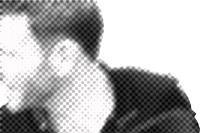A Friend We Had in Marshmallow
By Steve McFarland
The pervasive thought among the seven siblings was, "If it doesn't kill you, it should at least leave a welt." From oldest to youngest, frailties were exposed. Compassion was exploited. And books on pressure points were studied.
As the cycle wound its way through the older five, my sister Mo and I had the option of beating the dog or one another. And we loved Mickey.
So it went. Hair pulling contests that left each lying exhausted on the kitchen linoleum with tufts of red hair between our fingers. Throughout the many open-ended staring contests she mouthed the words, "I hate you," from across the dinner table. To which I replied with an exposed mouthful of chewed roast beef.
While Mo was preoccupied learning to read, I had the element of surprise and all day to plan. One day, she returned from the first day of second grade with a head full of Judy Bloom. I attempted an open-field tackle in the living room. She countered with a well-timed hip-check. While sitting in the flower garden in front of the house, I quickly realized, "Mo just threw me out the living room window!"
She got spanked. I picked myself out of the begonias, brushed myself off and caught the end of a Gilligan's Island rerun. Mom turned to Donahue while I decided revenge would be a dish best served cold and with a wooden bat across the calves.
Empathy was reserved, however, for the many feral cats that sought refuge from life on the road in rural Wisconsin. When they'd arrive, each was given a bed in the garage where Mo and I observed them from seats on a hay bail. Each straggler was offered milk and assigned an appropriate name based on our observations.
Cindy was a single mother of three: Doug, Lucy and the runt Marshmallow. Marshmallow's crossed-eyes were his dominant characteristic. They were also blamed for his unsteady footwork. But he had many special needs. Among them was a tail that suffered from what occupational therapists refer to as spasticity. Clearly, Marshmallow could not catch a break.
Ultimately, pneumonia would prove itself the battle Marshmallow couldn't win. The malaise, shivering, sneezing with copious expectorate. Textbook.
Cindy didn't come looking for pity or a handout. She welcomed our help with blowing Marshmallow's nose, but it was always repaid with a headless bird on the doorstep.
Soon the hostel became a hospice as Marshmallow's health deteriorated. It all came to an abrupt end one afternoon. After being informed that my program had been brought to me by the letter "R," I paid a regular visit to the garage. Right away I sensed something was amiss.
"Marshmallow won't wake up, and he's all stiff," I yelled through the screen door. I had seen my mom work wonders clearing the yellow gunk from Marshmallow's cataracts. But sadly, even she was powerless.
When Mo came home from school that day, there were no fisticuffs, no yelling and no ridicule. Whatever sibling rivalry existed, it seemed irrelevant now.
Marshmallow was gone. "To a better place," we were told. But we knew full-well that Dad had buried Marshmallow next to the burning barrel. Cindy, Doug and Lucy apparently had gone to a better place, however. They were never seen or heard from again.
The cool East wind blew in nightfall and eventually winter. The black garbage bag taped to the picture window frame flapped violently as the Falcons Crest theme carried in from the living room.
"I dare you to eat a piece," Mo said holding a handful of Mickey's food.
"No way," I was plenty game for dares, but I wasn't an idiot.
"Come on. It tastes like pizza."
"You eat it then."
"Fine, I will. But you have to close your eyes."
That night I learned lasting lessons about life, death and the taste of dry dog food.
| 